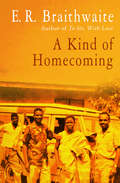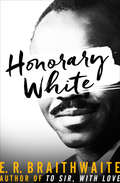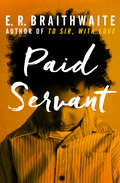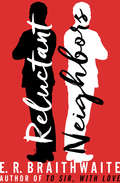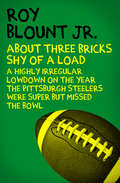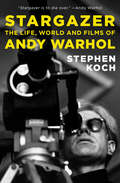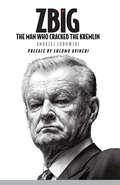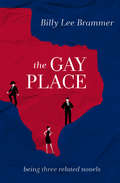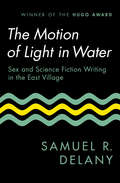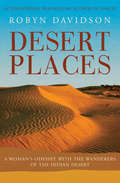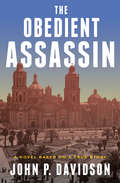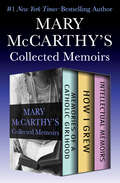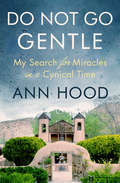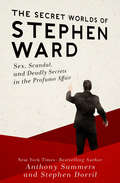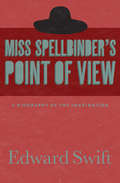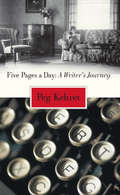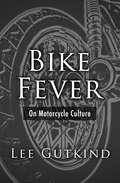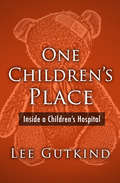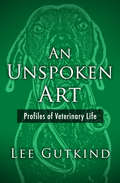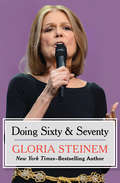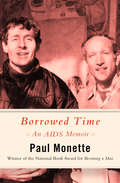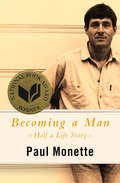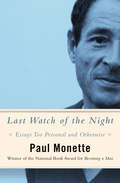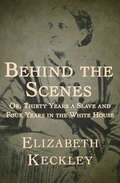- Table View
- List View
A Kind of Homecoming: Honorary White, Reluctant Neighbors, And A Kind Of Homecoming
by E. R. BraithwaiteFrom the bestselling author of To Sir, With Love comes the moving personal memoir of a westernized black man who journeys to Africa in search of his roots and discovers a vibrant and extraordinary society on the verge of monumental changeIn the early 1960s acclaimed British Guianese author E. R. Braithwaite embarked on a pilgrimage to the West African countries of Ghana, Guinea, Liberia, and across Sierra Leone just as the emerging nation was preparing to declare its independence. What Braithwaite discovered was a world vastly different from the staid, firmly established British society in which he had spent most of his life. In a place as foreign to him as the dark side of the moon, he was overcome by colorful sights, sounds, and smells that vividly reawakened lost memories from his childhood. Entering the intimate circles of the local intelligentsia, Braithwaite was able to view these newly evolving African societies from the inside, struck by their mixtures of passion and naïveté, their political obsessions and technological indifference. The author discovered a world that fascinated, excited, and, in some cases, deeply troubled him—and in the process he discovered himself.E. R. Braithwaite&’s A Kind of Homecoming is at once an enthralling personal journey and an eye-opening chronicle of a time of great change on the African continent that helps us to better understand the West Africa of today.
Honorary White: A Visit To South Africa
by E. R. BraithwaiteAcclaimed author E. R. Braithwaite (To Sir, With Love) chronicles the brutality, oppression, and courage he witnessed as a black man granted &“Honorary White&” status during a six-week visit to apartheid South AfricaAs a black man living in a white-dominated world, author E. R. Braithwaite was painfully aware of the multitude of injustices suffered by people of color and he wrote powerfully and poignantly about racial discrimination in his acclaimed novels and nonfiction works. So it came as a complete surprise when, in 1973, the longstanding ban on his books was lifted by the South African government, a ruling body of minority whites that brutally oppressed the black majority through apartheid laws. Applying for a visa—and secretly hoping to be refused—he was granted the official status of &“Honorary White&” for the length of his stay. As such, Braithwaite would be afforded some of the freedoms that South Africa&’s black population was denied, yet would nonetheless be considered inferior by the white establishment.With Honorary White, Braithwaite bears witness to a dark and troubling time, relating with grave honesty and power the shocking abuses, inequities, and horrors he observed and experienced firsthand during his six-week stay in a criminal nation. His book is a personal testament to the savagery of apartheid and to the courage of those who refused to be broken by it.
Paid Servant
by E. R. BraithwaiteE. R. Braithwaite, the acclaimed author of To Sir, With Love, poignantly recounts his time as a social worker dedicated to London&’s abandoned minority children Despite his Cambridge education and a sterling record with the British Royal Air Force during World War II, E. R. Braithwaite, a black man, was unable to find employment as an engineer in post-war London. Instead he accepted a position as a teacher in a tough East End school and wrote of his experiences in his classic bestseller To Sir, With Love. Nine years later, Braithwaite once again found himself assuming an unfamiliar professional role as a social worker charged with finding homes for London&’s orphaned, abused, or abandoned &“coloured&” children. While he lacked formal training, Braithwaite possessed qualities essential for the job: compassion, determination, and a deep, abiding understanding and love for the helpless, lost, and disregarded. In Paid Servant, E. R. Braithwaite shares his experiences in London&’s Department of Child Welfare, focusing on the case of his four-year-old client Roddy, a bright, handsome mulatto boy who was rejected for adoption by both black and white families because he was not their &“own kind.&” Everywhere he turned, Braithwaite encountered racial prejudice. But he was willing to fight for what he believed in, and he believed in Roddy. Writing with great power, warmth, and a deep belief in human dignity and worth, Braithwaite offers a heartbreaking yet hopeful look into a society&’s attempt to care for its youngest, most vulnerable citizens.
Reluctant Neighbors: Honorary White, Reluctant Neighbors, And A Kind Of Homecoming
by E. R. BraithwaiteThe acclaimed author of To Sir, With Love recalls his lifelong struggle against ignorance and racism while sharing a train ride with a bigoted white neighborOn a commuter train traveling from New Canaan, Connecticut, to New York&’s Grand Central Station, a well-heeled white suburbanite reluctantly takes the only available seat and eventually strikes up a conversation with the black man sitting next to him. The white businessman&’s verbal barrage of insensitive questions and offensive remarks incites a rage in his black neighbor that can barely be suppressed. But the offended rider is E. R. Braithwaite—former Royal Air Force pilot, Cambridge graduate, schoolteacher, social worker, diplomat, and bestselling author—and he has triumphed over prejudice and hatred throughout his truly extraordinary life and multifaceted career.Against the backdrop of a short railway commute, E. R. Braithwaite powerfully recounts a personal history of remarkable accomplishments in the face of bigotry and hatred. Part memoir, part treatise on racial intolerance and oppression, and the ignorance that engenders them, Reluctant Neighbors is the unforgettable story of one man&’s continuous struggle against injustice and his unwavering dedication to the pursuit of human dignity.
About Three Bricks Shy of a Load: A Highly Irregular Lowdown on the Year the Pittsburgh Steelers Were Super but Missed the Bowl
by Roy Blount Jr.Now celebrating its fortieth anniversary, Roy Blount Jr.&’s classic account of the 1973 Pittsburgh Steelers—a team on the cusp of once-in-a-generation greatness The Pittsburgh Steelers of the 1970s are mentioned in any conversation about the greatest dynasties in NFL history. A year before Pittsburgh&’s first Super Bowl victory launched a decade of domination, Roy Blount Jr. spent a season traveling with the team, recording the ups and downs, both large and small, in the lives of men who would soon reach the pinnacle of success in their sport. He covers everything from the birth of the &“Steel Curtain&” defense to the unique connection the people of Pittsburgh had with their hard-nosed team. Interspersed with vivid depictions of players like Terry Bradshaw, &“Mean&” Joe Greene, and Ernie &“Fats&” Holmes, as well as the team owners, the Rooney clan, About Three Bricks Shy of a Load harks back to a bygone era when offensive linemen could weigh about the same as the backs they blocked for, when the highest-paying team&’s highest-paid player—Bradshaw—made $400,000, and when one team was able to win four Super Bowls in six years—a feat that remains unrivaled today. Uproariously funny and brilliantly written, About Three Bricks Shy of a Load was named one of the Top 100 Sports Books of All Time by Sports Illustrated.
Stargazer: The Life, World and Films of Andy Warhol
by Stephen KochThe definitive critical study of twentieth-century pop culture icon Andy Warhol, the man who redrew the boundaries of art. Andy Warhol&’s work and personality changed American visual culture forever, making him an international superstar. In this must-read volume, heralded as &“exemplary&” by Artforum and &“resoundingly brilliant&” by Film Comment, Stephen Koch provides unprecedented detail on Warhol&’s life and work—his rise to global fame, his entanglement with the seedy New York sexual underground, and the shocking assassination attempt that almost ended his life are chronicled—giving particular attention to a medium that found Andy at his wildest: film. The &“superstars&” he created—Candy Darling, Ultra Violet, Edie Sedgwick—to populate his films and his curation of socialites mingling with hustlers that coined the phrase &“The Beautiful People&” seem prescient as we consider today&’s stars and cultural panorama. In Stargazer, Koch illuminates the inspiration and brilliance on both sides of the public image that Warhol, who made paradox an art form, so meticulously crafted. In doing so, he gets to the core of Warhol&’s most interesting invention: his own public personality, the strange persona that this frightened and brilliantly talented poor-boy from Pittsburgh created to survive the savage world of his own ambitions. &“Stargazer is to die over.&” —Andy Warhol &“A volume of profound insight . . . resoundingly brilliant. It assumes the place of cornerstone in what will someday become a scholarly edifice dedicated to the analysis both of Warhol&’s meanings and of Warhol&’s forms.&” —Film Comment &“Some of the most exemplary critical writing that I have encountered. Moving across the convoluted terrain of Warhol&’s sensibility . . . with an ease and fluidity that draws the reader effortlessly around their quarry.&” —Artforum &“A landmark in American criticism . . . Stargazer is not only compelling beyond anything one expects of criticism, it happens also to be utterly timely.&” —The Boston Phoenix
Zbig: The Man Who Cracked the Kremlin
by Andrzej Lubowski"Kissinger opted for a strategy of accommodation with Moscow, while Brzezinski, claiming that the very nature of Soviet ideology and policies prevents stability, sought strategies for undermining the Soviet system. . . . In retrospect, Brzezinski was proven right and Kissinger was wrong." --Shlomo Avineri in the preface Zbigniew Brzezinski, widely regarded as a key actor in the last half-century of American foreign policy, remains a high-profile commentator on current events and an influential critic of some policies of subsequent administrations. His intellect and eloquent wit have made him an irreplaceable and controversial part of the American scene. He continues to fascinate historians, journalists, and conspiracy theorists. This is not a conventional doorstop biography. Instead, Zbig focuses on Brzezinski's critical and underappreciated contribution to the collapse of the Soviet Union--his lifelong mission. Utterly free of illusions about the nature of Communist power, Brzezinski advocated "peaceful engagement" as the best tactic for exploiting systemic Soviet vulnerabilities. His stand on human rights and his tutelage of and influence on President Jimmy Carter had a profound effect on the course of the Cold War.Zbig also compares Brzezinski with his Harvard rival, Henry Kissinger--a strong proponent of realpolitik. Brilliant as Kissinger is, he did little to change American perceptions of the world in a lasting way. Brzezinski did.
The Gay Place: Being Three Related Novels (Texas Classics Ser.)
by Billy Lee Brammer&“The best novel about American politics in our time.&” —Willie MorrisSet deep in the heart of Texas, The Gay Place consists of three interlocking novels—The Flea Circus, Room Enough to Caper, and Country Pleasures—each with a different protagonist. Unifying the stories is Texas governor Arthur Fenstemaker, a canny master politician modeled on Lyndon Johnson, for whom the author served as a press aide. The governor uses any means necessary to do what needs to be done, while the other characters struggle with their conflicts of marriage and family, love and lust.Originally published in 1961, The Gay Place withstands the test of time—the themes of power, money, and family are eternally resonant. At once a political novel and a character study, Billy Lee Brammer&’s classic stands among the best novels about the Lone Star state.
The Motion of Light in Water: Sex and Science Fiction Writing in the East Village
by Samuel R. DelanyThis Hugo Award–winning memoir is &“a very moving, intensely fascinating literary autobiography from an extraordinary writer&” (William Gibson, Nebula and Hugo Award–winning author of Neuromancer). With the poet Marilyn Hacker, Delany moves into a tenement on a dead-end street that the landlord reserves for interracial couples. Between playing folk music in the evenings at the same Greenwich Village coffee shop as Bob Dylan and preparing shrimp curry for W. H. Auden and Chester Khalman, who have accepted an invitation that night for dinner, Delany takes a stab at writing science fiction. This young prodigy would complete and sell five novels before he turned twenty-two! (And then have a nervous breakdown . . .) This beautifully written memoir is a testament to a neighborhood where experimentation was a way of life. This ebook features an illustrated biography of Samuel R. Delany including rare images from his early career.
Desert Places: A Woman's Odyssey with the Wanderers of the Indian Desert
by Robyn DavidsonFrom the bestselling author of Tracks: A travel writer&’s memoir of her year with the nomadic Rabari tribe on the border between Pakistan and India. India&’s Thar Desert has been the home of the Rabari herders for thousands of years. In 1990, Australian Robyn Davidson, &“as natural a travel writer as she is an adventurer,&” spent a year with the Rabari, whose livelihood is increasingly endangered by India&’s rapid development (The New Yorker). Enduring the daily hardships of life in the desert while immersed in the austere beauty of the arid landscape, Davidson subsisted on a diet of goat milk, roti, and parasite-infested water. She collided with India&’s rigid caste system and cultural idiosyncrasies, confronted extreme sleep deprivation, and fought feelings of alienation amid the nation&’s isolated rural peoples—finding both intense suffering and a renewed sense of beauty and belonging among the Rabari family. Rich with detail and honest in its depictions of cultural differences, Desert Places is an unforgettable story of fortitude in the face of struggle and an ode to the rapidly disappearing way of life of the herders of northwestern India. &“Davidson will both disturb and exhilarate readers with the acuity of her observations, the sting of her wit, and the candor of her emotions&” (Booklist).
The Obedient Assassin: A Novel Based on a True Story
by John P. DavidsonA dark and riveting thriller that reimagines the life and mission of the Spanish nationalist enlisted to murder Leon Trotsky: Based on a true chapter of world history and ten years of research, here is the story of the real-life reluctant soldier and killer, Ramón Mercader—the obedient assassinRamón Mercader was plucked from the front of the Spanish Civil War by the Soviets and conscripted to murder the great intellectual Leon Trotsky, a leader of the Bolshevik Revolution who was exiled in the 1920s for opposing Joseph Stalin.As Ramón is trained for the task and assumes a new identity, he lives a lush life in Paris, befriending Frida Kahlo and other artists of the time. He falls in love with a left-leaning Jewish woman whom he is ordered to seduce as a means of getting at Trotsky.From Barcelona to Paris and New York to Mexico City, the group controlling Ramón—including Ramón&’s mother and her lover—guides the assassin on the inevitable resolution of his grim task as he must penetrate Trotsky&’s compound.
Mary McCarthy's Collected Memoirs: Memories of a Catholic Girlhood, How I Grew, and Intellectual Memoirs
by Mary McCarthyThree candid, affecting memoirs by the #1 New York Times–bestselling author of The Group, including a National Book Award finalist. In Memories of a Catholic Girlhood, Mary McCarthy begins with her recollections of a happy childhood cut tragically short by the death of her parents during the influenza epidemic of 1918. Tempering memory with invention, McCarthy describes how, orphaned at six, she spent much of her childhood shuttled between two sets of grandparents and three religions—Catholic, Protestant, and Jewish. Early on, McCarthy lets the reader in on her secret: The chapter you just read may not be wholly reliable—facts have been distilled through the hazy lens of time and distance.How I Grew is McCarthy&’s intensely personal autobiography of her life from age thirteen to twenty-one. With detail driven by an almost astonishing memory recall, the author gives us a masterful account of these formative years. From her wild adolescence—including losing her virginity at fourteen—through her eventual escape to Vassar, the bestselling novelist, essayist, and critic chronicles her relationships with family, friends, lovers, and the teachers who would influence her writing career. And Intellectual Memoirs opens with McCarthy as a married twenty-four-year-old Communist and critic. She&’s disciplined, dedicated, and sexually experimental: At one point she realizes that in twenty-four hours she &“had slept with three different men.&” Over the course of three years, she will have had two husbands, the second being the esteemed, much older critic Edmund Wilson. It is Wilson who becomes McCarthy&’s mentor and muse, urging her to try her hand at fiction. Intellectual Memoirs is a vivid snapshot of a distinctive place and time—New York in the late 1930s—and the forces that shaped Mary McCarthy&’s life as a woman and a writer.
Do Not Go Gentle: My Search for Miracles in a Cynical Time
by Ann HoodA &“breathtaking&” memoir of a daughter&’s quest to find a miracle for her dying father, by the bestselling author of The Book That Matters Most (Publishers Weekly). When her beloved father was diagnosed with inoperable lung cancer, Ann Hood—the author Comfort: A Journey Through Grief—refused to give up. If conventional medicine could no longer help, then she would go to any length to find something that could—even if it took a miracle. In this heartfelt and heartbreaking narrative, Ann&’s quest to save her father&’s life becomes a reawakening of her self. Through trial and desperation she recollects the story of her family&’s own past and their quest to find a better life in America, and renews her connection to her Italian Catholic heritage, all of which reminds her of where she came from and who she truly is: her father&’s daughter. With a sensitive yet strong voice, Ann Hood&’s &“spiritual quest to make sense of her father&’s fatal illness is rendered with exceptional grace&” in a story that &“affectingly explores the link between faith and family ties&” (Entertainment Weekly). &“[Ann Hood] creates an entire world of belief and tradition that sustains her. . . . The miracle that truly nurtures her is her art.&” —The Providence Journal &“This memoir is every bit as breathtaking as the poem after which it is named.&” —Publishers Weekly
The Secret Worlds of Stephen Ward: Sex, Scandal, and Deadly Secrets in the Profumo Affair
by Anthony Summers Stephen DorrilA tour de force account of seduction, power, and betrayal in the biggest political sex scandal of its ageThe Profumo Affair rocked the British establishment like no scandal before or since. The Tory war minister, John Profumo, had taken up with a teenager named Christine Keeler, who was also sleeping with a Soviet intelligence agent. The ensuing inquiry revealed a hidden underworld in which men of the ruling classes and politicians cavorted with prostitutes at orgies. The revelations shook the British government and sent shock waves all the way to the Kennedy White House. The man at the center of the storm was Dr. Stephen Ward.Ward was a successful doctor to the rich and powerful, a talented artist who drew portraits of many of his famous patients and fixed up prominent men with young women. He was also a pawn, ruthlessly exploited by the intelligence agencies. When the Profumo Affair threatened the government, Ward became a scapegoat, hounded to death—and perhaps murdered.For the first time, The Secret Worlds of Stephen Ward reveals the names that could not be exposed and the truths that could not be told until now.
Miss Spellbinder's Point of View: A Biography of the Imagination
by Edward SwiftIn this &“delightful and bizarre&” novel, Clarissa Spellbinder spins the yarn of her truly unbelievable—and completely unverified—life (The Boston Globe). Miss Clarissa Spellbinder has lived a truly astonishing life . . . or so she tells us. Her father was the intrepid adventurer Lord Andrew Spellbinder and her mother, the fiery Latin songbird Amelita de la Luna, who traveled the world and escaped almost certain death on numerous occasions. Miss Spellbinder relates their spectacular exploits to the patrons of the Back Door Bar That Once Faced the Sea on the fantastical island of Moly—though her listeners seem far more interested in hearing about the misadventures (of the sexual variety, mainly) of Clarissa&’s enormous neighbor, the former carnival circuit star Fat Satsuma Johnson, a.k.a. the Black Queen of the Atchafalaya, a.k.a. the pie-eating queen of southern Louisiana. Miss Spellbinder, of course, is more than happy to oblige, since all her stories serve as ammunition in her ongoing battle against &“the disease of the literal minded.&” What matters most, she tells us, is a unique point of view, for without one, &“you have no pinnacle on which to stand and express yourself.&” Edward Swift (Splendora) indulges readers with a novel unlike anything they have read before, an epic voyage through the outrageous history, real and imagined, of Miss Clarissa Spellbinder. It is a journey that may entail a certain suspension of disbelief—but afterward, the world will look very different.
Five Pages a Day
by Peg KehretPeg Kehret, who told of her childhood battle with polio in Small Steps: The Year I Got Polio, now shares the story of her writing career. It began at the age of ten when she wrote and sold the Dog Newspaper. The paper was supposed to feature the tales of local dogs, but mostly it was about her own dog, B.J. After four issues, it folded. But Peg learned a valuable lesson: If she wanted people to read what she wrote, she had to write something interesting. Peg went on to write radio commercials, prize-winning contest entries, magazine articles, plays, and adult nonfiction books before she discovered her true voice as a writer in books for young people.
Bike Fever: On Motorcycle Culture
by Lee GutkindLee Gutkind&’s memoir of motorcycling, and an ode to the solitude, independence, and exhilaration of the open roadFew things loom as large in our imaginations as the idea of a cross-country trip, exposed to the elements and open to whatever challenges lie around the bend. In the early 1970s, looking to experience and explain the allure of the road trip, Lee Gutkind embarked on a long motorcycle road trip, documenting the misadventures and magic that he found along the way. He writes of the men whose journeys continue to resonate, from Lawrence of Arabia to the Hell&’s Angels. He explores the appeal of the motorcycle—his vehicle of choice—and its historically loaded place in the American imagination. And he revels in the country&’s diverse and striking landscapes, as seen while moving through woods, plains, mountains, and deserts.An inspiring and evocative tribute to the power of the journey, Bike Fever is a classic rendering of the unique freedom wrought by a motorcycle and a long highway.
One Children's Place: Inside a Children's Hospital
by Lee Gutkind&“A welcome and poignant account of the intense human and political dynamics of a major children&’s hospital that will have a substantial impact on the way you view children and their care.&” —The New England Journal of MedicineLee Gutkind is a master at stepping into the worlds of medicine and revealing the unique desires, characteristics, and stories of the people therein. For One Children&’s Place, he spent two years at Children&’s Hospital of Pittsburgh, observing not just the patients but also their nurses, surgeons, therapists, administrators, and families. What he found was an institution that excelled at responding to the needs of the children who stayed there, from the professionals who dealt with the unique problems of hospital furniture and design, to the nurses and social workers who became unwaveringly close allies to their young charges, to the doctors who undertook risky new procedures to save lives.Brimming with hope and animated by fascinating anecdotes, One Children&’s Place is a powerful portrait of heroism and heartbreak, by one of America&’s foremost nonfiction storytellers.
An Unspoken Art: Profiles of Veterinary Life
by Lee GutkindIn the tradition of James Herriot&’s All Creatures Great and Small, An Unspoken Art is Lee Gutkind&’s captivating look at the lives of veterinarians, from the zoos to the farmLee Gutkind, the godfather of creative nonfiction, explores with warmth and sincerity the worlds of modern-day veterinarians—from practitioners operating on Manhattan&’s Upper East Side to those working knee deep in mud in the English countryside. Gutkind profiles the men and women who have devoted their lives to the care of animals, almost all treating their patients with more humanity and compassion than physicians in human hospitals do. He writes of the people who do not bat an eye at sharing a bed with their dogs, and of those who spare no expense when it comes to the well-being of their pets.An Unspoken Art is an insightful look at the individuals who dedicate themselves to the care of creatures, and of the enduring bond between people and animals.
Doing Sixty & Seventy
by Gloria SteinemReflections on women&’s aging from the New York Times–bestselling author who inspired the film The Glorias.One day I woke up and there was a seventy-year-old woman in my bed . . . Gloria Steinem has been an eloquent and outspoken voice for women&’s rights and equality for more than four decades. In Doing Sixty & Seventy she addresses an essential concern of people everywhere—and especially of women: the issue of aging. Whereas turning fifty, in her experience, is &“leaving a much-loved and familiar country,&” turning sixty means &“arriving at the border of a new one.&” With insight, intelligence, wit, and heartfelt honesty, she explores the landscapes of this new country and celebrates what she has called &“the greatest adventure of our lives.&” While appreciating everybody&’s experiences as different, Steinem sees these years as charged with possibilities. Dealing with stereotypes and the &“invisibility&” that often accompany a woman&’s senior years can be as liberating as it is frustrating. It frees women as well as men to embrace that &“full, glorious, alive-in-the-moment, don&’t-give-a-damn yet caring-for-everything sense of the right now.&” This ebook features an illustrated biography of Gloria Steinem including rare images and never-before-seen documents from the author&’s personal collection.
Doing Sixty & Seventy
by Gloria SteinemReflections on women&’s aging from the New York Times–bestselling author who inspired the film The Glorias.One day I woke up and there was a seventy-year-old woman in my bed . . . Gloria Steinem has been an eloquent and outspoken voice for women&’s rights and equality for more than four decades. In Doing Sixty & Seventy she addresses an essential concern of people everywhere—and especially of women: the issue of aging. Whereas turning fifty, in her experience, is &“leaving a much-loved and familiar country,&” turning sixty means &“arriving at the border of a new one.&” With insight, intelligence, wit, and heartfelt honesty, she explores the landscapes of this new country and celebrates what she has called &“the greatest adventure of our lives.&” While appreciating everybody&’s experiences as different, Steinem sees these years as charged with possibilities. Dealing with stereotypes and the &“invisibility&” that often accompany a woman&’s senior years can be as liberating as it is frustrating. It frees women as well as men to embrace that &“full, glorious, alive-in-the-moment, don&’t-give-a-damn yet caring-for-everything sense of the right now.&” This ebook features an illustrated biography of Gloria Steinem including rare images and never-before-seen documents from the author&’s personal collection.
Borrowed Time: An AIDS Memoir
by Paul Monette&“An eloquent testimonial to the power of love and the devastation of loss&” from the National Book Award–winning author of Becoming a Man (Publishers Weekly). In 1974, Paul Monette met Roger Horwitz, the man with whom he would share more than a decade of his life. In 1986, Roger died of complications from AIDS. Borrowed Time traces this love story from start to tragic finish. At a time when the medical community was just beginning to understand this mysterious and virulent disease, Monette and others like him were coming to terms with unfathomable loss. This personal account of the early days of the AIDS crisis tells the story of love in the face of death. A finalist for the National Book Critics Circle Award, Borrowed Time was one of the first memoirs to deal candidly with AIDS and is as moving and relevant now as it was more than twenty-five years ago. Written with fierce honesty and heartwarming tenderness, this book is part love story, part testimony, and part requiem. This ebook features an illustrated biography of Paul Monette including rare images and never-before-seen documents from the Paul Monette papers of the UCLA Library Special Collections.
Becoming a Man: Half a Life Story (Perennial Classics Ser.)
by Paul MonetteThe National Book Award–winning coming-out memoir. &“One of the most complex, moral, personal, and political books to have been written about gay life&” (LA Weekly). Paul Monette grew up all-American, Catholic, overachieving . . . and closeted. As a child of the 1950s, a time when a kid suspected of being a &“homo&” would routinely be beaten up, Monette kept his secret throughout his adolescence. He wrestled with his sexuality for the first thirty years of his life, priding himself on his ability to &“pass&” for straight. The story of his journey to adulthood and to self-acceptance with grace and honesty, this intimate portrait of a young man&’s struggle with his own desires is witty, humorous, and deeply felt. Before his death of complications from AIDS in 1995, Monette was an outspoken activist crusading for gay rights. Becoming a Man shows his courageous path to stand up for his own right to love and be loved. This ebook features an illustrated biography of Paul Monette including rare images and never-before-seen documents from the Paul Monette papers of the UCLA Library Special Collections.
Last Watch of the Night: Essays Too Personal and Otherwise
by Paul MonetteTender and passionate autobiographical essays by the National Book Award–winning author of Becoming a Man. &“Does it go too fast?&” Monette asks about life at the beginning of one piece. The answer is a resounding &“yes&” for the individuals who populate this stunning work of nonfiction. These ten autobiographical essays memorialize those whose lives have been claimed by AIDS. Following Becoming a Man and Borrowed Time, Last Watch of the Night is Monette&’s third and final self-portrait. In this collection, he confronts death—those of lovers and friends, and even his own eventual demise—with both bravery and compassion.This ebook features an illustrated biography of Paul Monette including rare images and never-before-seen documents from the Paul Monette papers of the UCLA Library Special Collections.
Behind the Scenes: Or, Thirty Years a Slave and Four Years in the White House (American Biography Ser.)
by Elizabeth KeckleyThe remarkable story of the former slave who became Mary Todd Lincoln's dressmaker and closest confidante Born into slavery in Virginia, Elizabeth Keckley was whipped, sexually abused, and separated from her mother for long stretches of time. When her master eventually settled in St. Louis, Missouri, Keckley resolved to buy her freedom. She put to use her talents as a seamstress and found patrons among the wives of the city's elite, eventually earning enough money to move with her young son to Washington, DC. In the nation's capital, Keckley started her own business and soon had commissions from the wives of Robert E. Lee, Jefferson Davis, Stephen A. Douglas, and Edwin Stanton. Hired by Mary Todd Lincoln to be her personal modiste, Keckley formed a close friendship with the first lady, a relationship strengthened by the tragedies they endured together, including the deaths of their sons and the assassination of President Abraham Lincoln. Published to great controversy in 1868, Behind the Scenes offers an intimate and revealing portrait of life inside the White House as well as the stirring story of one woman's fight to rise above the horrors of slavery. Frequently cited in studies of the Civil War and biographies of the Lincolns, it is a must read for students of American history. This ebook has been professionally proofread to ensure accuracy and readability on all devices.
